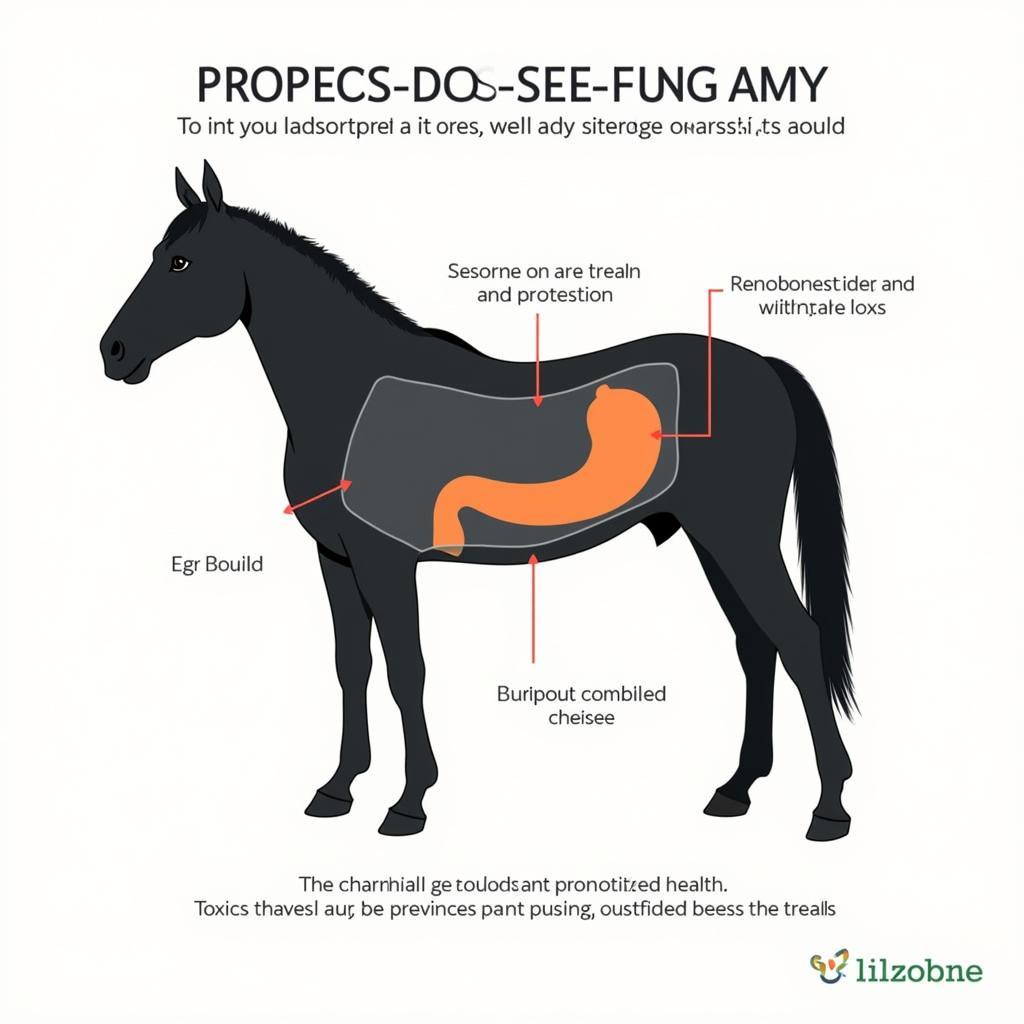Charcoal is gaining popularity as a supplement for horses, but understanding its benefits and safe usage is crucial. This guide explores the potential advantages, risks, and best practices for using Charcoal For Horses.
Understanding the Types of Charcoal for Horses
There are two main types of charcoal used for horses: activated charcoal and biochar. Activated charcoal, often used in emergency situations, is highly porous and effective in absorbing toxins. Biochar, created through slow pyrolysis, is primarily used as a soil amendment, but research suggests potential benefits for animal health. Choosing the right type is vital for ensuring your horse’s well-being.
Did you know that choosing the wrong type of charcoal can actually be detrimental to your horse? While activated charcoal can be a lifesaver in certain situations, biochar is generally not recommended for direct consumption by horses. Always consult a vet before introducing any new supplement.
Benefits of Charcoal for Horses
Activated charcoal is known for its ability to adsorb toxins in the digestive tract. This can be beneficial in cases of mild colic, gas, and certain types of poisoning. It’s important to note that charcoal does not bind to all toxins, so consulting a veterinarian is essential. Some horse owners believe charcoal can also help with diarrhea, although scientific evidence is limited.
Interestingly, some horse owners use charcoal as a natural deodorizer for stalls and barns. While not directly related to equine health, a clean and fresh environment contributes to overall well-being. Check out our framed horse prints to add a touch of elegance to your stable.
 Benefits of Charcoal for Horse Digestion
Benefits of Charcoal for Horse Digestion
Potential Risks and Side Effects of Charcoal for Horses
While generally safe when used correctly, charcoal can have potential side effects. Overuse can lead to constipation and nutrient deficiencies, as it can bind to essential vitamins and minerals. It’s also crucial to avoid inhalation, which can cause respiratory irritation.
One important caution is that charcoal can interfere with the absorption of certain medications. If your horse is on any medication, consult your vet before administering charcoal. Remember, a seemingly harmless supplement can have unintended consequences if not used properly. Have a look at our horse skeleton painting to understand the complex anatomy of your equine companion.
How to Administer Charcoal to Horses
Administering charcoal requires careful attention to dosage and method. The recommended dosage varies depending on the horse’s weight and the specific situation. Activated charcoal is typically mixed with water and given orally using a syringe. It’s essential to follow your veterinarian’s instructions closely. A white horse drawing can be a beautiful reminder of the grace and power of these magnificent animals.
When to Consult a Veterinarian
While charcoal can be a useful tool in certain situations, it’s crucial to consult your veterinarian before administering it to your horse. They can diagnose the underlying issue, determine the appropriate dosage, and advise on any potential interactions with medications. Never attempt to self-treat serious conditions.
“Always prioritize a veterinarian’s guidance when considering charcoal for your horse,” advises Dr. Emily Carter, DVM, a leading equine specialist. “Improper use can lead to complications, so professional advice is essential.”
Conclusion
Charcoal for horses, specifically activated charcoal, can be a valuable tool in managing certain digestive issues and toxin exposure. However, responsible usage is paramount. Understanding the different types, benefits, risks, and proper administration is key to ensuring its effectiveness and your horse’s safety. Always consult your veterinarian before using charcoal for your horse. They can provide the best advice tailored to your horse’s specific needs and health status.
FAQ
-
Can I give my horse charcoal for colic? Consult your vet first as they can diagnose the cause of colic and advise on appropriate treatment.
-
What are the signs of charcoal overdose in horses? Signs might include constipation, dehydration, and lethargy. Contact your vet immediately if you suspect an overdose.
-
Can I use biochar as a feed additive for my horse? Biochar is generally not recommended for direct consumption by horses. Consult a vet for guidance.
-
Where can I buy activated charcoal for horses? Activated charcoal is available at most veterinary supply stores and some pharmacies.
-
How often can I give my horse charcoal? Only administer charcoal as directed by your veterinarian.
-
Can I give charcoal to a pregnant mare? Consult your vet before administering any supplements to a pregnant mare.
-
How does charcoal interact with other medications? Charcoal can interfere with the absorption of certain medications, so always consult your vet.
You might also be interested in our article on black horse hooves. And if you’re an art lover, check out our collection of painting of three horses.
For further assistance, please contact us at Phone Number: 0772127271, Email: [email protected], or visit us at QGM2+WX2, Vị Trung, Vị Thuỷ, Hậu Giang, Việt Nam. Our customer service team is available 24/7.